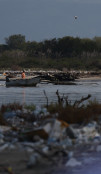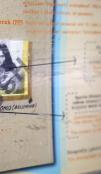Learning to walk at 70s, how EU4SocialCare assists vulnerable community in Kamez

“Now, Mr Mehmet, do you remember how to turn to your left? First, lift your leg slightly while leaning on the crutch, then make the turn gently. Yes, that’s it, very good.”
The physiotherapist watches closely as Mehmet Bajrami makes his careful movements. The 74-year-old takes his time getting up from the armchair, performing the action in several stages. Each step is preceded by the physiotherapist’s voice reminding him of what he learned during therapy sessions.
Due to a cerebral ischaemia that left him paralysed on the left side, the elderly man lost the ability to walk almost three years ago. Now, in his seventies, he is learning to walk again, narrating each action as he performs it. Bajrami lives alone in Kamëz, as his children live abroad, which makes managing everyday necessities more difficult for him.
When he began physiotherapy, he couldn’t get out of bed. “We started with simple exercises for knee flexion, bending of the knee joint, to help lift the leg. Then we worked on the gluteal area to aid lower limb movement at the hip joint, followed by exercises for the iliopsoas muscles that help with hip movement. Afterwards, we practised the sit-to-stand process. Mr Mehmet learned how to get up, how to position his leg, how to distribute his body weight when standing, and how to hold and use the crutches. The next phase involved walking with assistance, then walking exercises, and we eventually managed to overcome obstacles on the ground,” explains physiotherapist Enion Cala.
Mr Bajrami is one of 62 citizens receiving home therapy services as part of the EU4SocialCare project, funded by the European Union. The project works to enhance local social care services and strengthen partnerships with citizens towards EU standards in 14 municipalities: Cërrik, Durrës, Elbasan, Gjirokastër, Kamëz, Kavajë, Korçë, Krujë, Kukës, Kurbin, Librazhd, Pogradec, Vlorë and Vorë.

EU Delegation to Albania
The initiative aims to strengthen local partnerships and capacities to plan, establish, expand, and deliver social care services — scaling up positive models of service delivery according to the priorities defined in the Local Social Plans of targeted municipalities. The action seeks to address the diverse needs of various social groups, particularly those at risk of exclusion and marginalisation.
After nearly three years of isolation, for Mehmet Bajrami, starting to move again is a way of reconnecting with life as it once was. Through combined exercises — such as weight transfer, arm (hemiparetic) and leg exercises, the main goals of therapy are to strengthen the muscles on the affected side, increase joint mobility, avoid stiffness, improve balance and body control, restore functional skills such as walking and hand use, and help the brain learn new ways to command the body (neuroplasticity).
In addition to physiotherapy, the project provides speech therapy, psychological treatment for various vulnerable groups, developmental therapy for children from families receiving cash assistance, and social transport services for individuals with disabilities.

EU Delegation to Albania
The Social Transport component includes the use of an accessible vehicle, which provides transportation for people with disabilities and the elderly who face difficulties travelling to health institutions or performing administrative tasks, such as applying for documents or benefits, due to the lack of adapted transport.
“This service represents an innovation in Albania, as it is being offered for the first time in this format and with such a direct approach to the community. It’s very important, considering that even private businesses, including taxis, don’t provide such services, making it extremely difficult for wheelchair users to get around,” says Suela Lala from the Together Foundation, one of the implementing partners of the project.
She notes that, thanks to EU4SocialCare, approximately the same number of people receive mobile services as those who attend therapies at the social centre in Kamëz.
The municipality estimates that around 400–500 residents in Kamëz need these services, some of whom live far from the social centre or Tirana hospitals.
On a rainy day, Ilir Rusi makes his way uphill through one of the rural areas of Paskuqan in his electric wheelchair. The EU4SocialCare car will accompany him to the ‘Mother Teresa’ University Hospital Centre, where he receives physiotherapy.

EU Delegation to Albania
“On such roads, you have to be careful not to fall, it’s hard to keep your balance. That’s why a car is needed. This is the first time I’m receiving this service. Usually, I go to the hospital with my electric wheelchair, which takes 45 minutes, but not on rainy days,” says Rusi, 51. He had an accident at the age of 19 that resulted in a C5 spinal cord injury.
“Physiotherapy is crucial during winter, as the cold causes muscle contraction. Physiotherapy helps the muscles move. I try to go to the hospital three times per week, but it depends on the weather,” he explains, underlining the importance of social transport services.
The Local Social Plan of Kamëz Municipality (2024–2026) identifies around 6,600 people in need of some form of social service, of whom 2,100 are persons with disabilities. A car that transports people like Ilir to hospital and waits to take them home is one of the services that EU4SocialCare is developing to help Albania reach EU standards.
BACKGROUND INFORMATION
"Enhancing Local Social Care Services Partnerships with Citizens and Toward EU Standards", is funded by the European Union with a budget of 3.1M EUR, implemented jointly by UNICEF Albania and World Vision Albania, in partnership with the Ministry of Health and Social Protection of the Republic of Albania.
This project is advancing the social care reform by expanding the social care system in the country, while ensuring that all children, persons with disabilities and individuals at risk of exclusion receive accessible, just and dignified services. EU4SocialCare works on enhancing and expanding the current social care services in Albania, while fostering an enabling environment for partnerships between local governments and civil society organizations.





